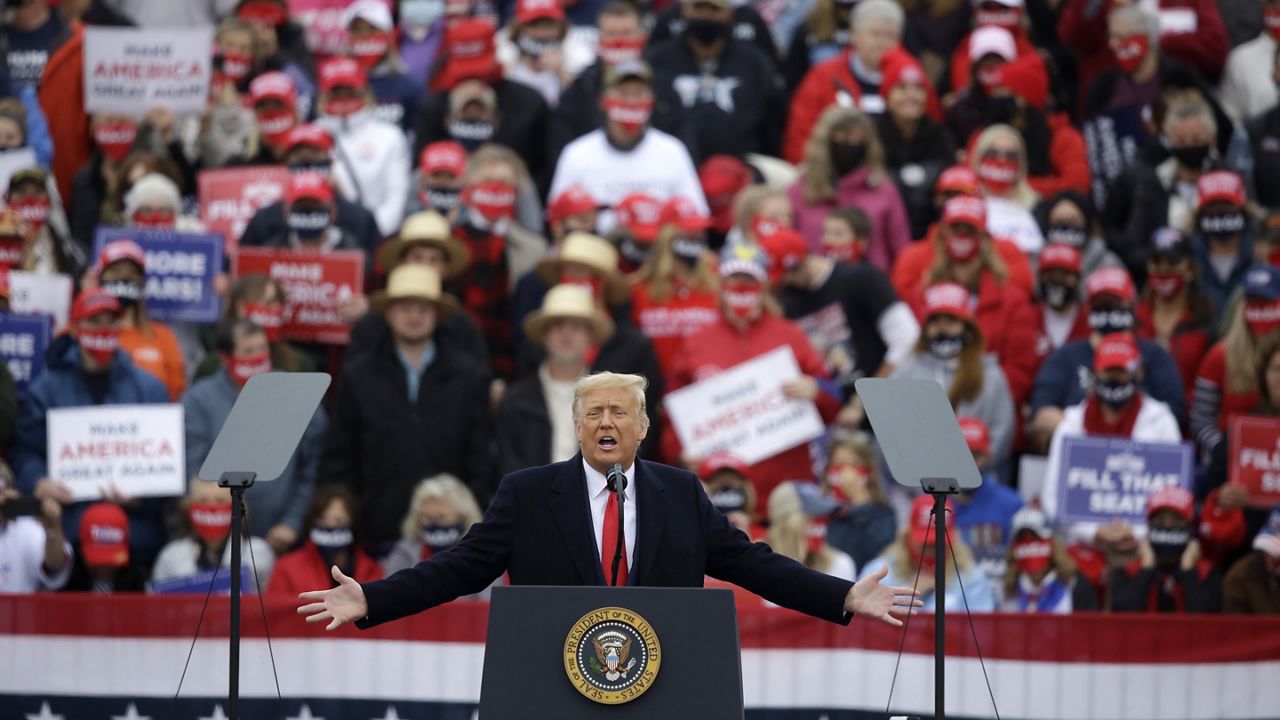WASHINGTON, D.C. — Seeing chaos where others don’t, President Donald Trump is falsely asserting that voting by mail is proving to be rife with problems across the country. For the most part, the surge in early votes has been managed smoothly.
Trump also made the impossible demand that all votes be counted election night. That is guaranteed not to happen. Some states will be counting mailed votes for days and many may not have final results that night. It’s all part of Trump’s effort to sow distrust in the integrity of the election if he loses.
He introduced a new twist in his case Tuesday, encouraging people who have already cast ballots for Democrat Joe Biden to change their vote to him. Some states allow people who voted early to change their ballot if they show up Election Day and nullify their initial vote; many do not.
TRUMP: “Big problems and discrepancies with Mail In Ballots all over the USA. Must have final total on November 3rd.” — tweet Monday.
THE FACTS: No, the catastrophe Trump has warned darkly about for months in mail-in voting has not materialized.
There have been sporadic reports of voters receiving mail ballots that were incorrectly formatted and other localized hitches in the record early turnout, but the large-scale disenfranchisement that election experts worried might happen has not been seen.
Trump has conspiratorially inflated local incidents, contending, for example, that mail-in ballots filled out for him are being dumped in rivers or creeks. This is a fabrication.
Three trays of mail were found by the side of a road and in a ditch — not a river or creek — in Greenville, Wisconsin, in mid-September. The sheriff initially said “several absentee ballots” were in the mix. The state’s elections officer later said no Wisconsin ballots were in the lost mail after all. No one said ballots marked for Trump were thrown out in the incident.
Trump’s motive for challenging votes by mail is plain: Democrats are dominating that segment of voting. Registered Democrats have also outnumbered registered Republicans in early voting in person at polling places, though the gap is narrower than with mailed ballots.
In short, Trump may need supporters to show up in huge numbers on Election Day if not before, and his baseless allegations of early-voting irregularities are designed to motivate them to do so as well as to portray the result as illegitimate if Biden wins.
As for his demand for a “final vote total” on election night, that flies in the face of how votes are counted and reported.
Apart from the usual lags in rounding up and reporting totals from every precinct in the country, the U.S. is seeing unprecedented numbers of early votes, and some battleground states won’t even start counting them until Election Day votes have been tallied.
Indeed, the Supreme Court is allowing Pennsylvania to count mailed ballots that are not even received by elections officials for three days after the election, as long as there’s no evidence that such ballots were filled out after Nov. 3. The court quashed an effort in Wisconsin to extend the absentee ballot deadline there.
Earlier in the campaign, Trump asserted that the winner should be declared on election night, another outcome no one can guarantee and one that may elude the country in a week. There is no requirement that the winner be determined Election Day.
He raised the question of delaying the election, then dropped it, but has persisted in groundless allegations that it is certain to be plagued by fraud.
TRUMP: “Strongly Trending (Google) since immediately after the second debate is CAN I CHANGE MY VOTE? This refers changing it to me. The answer in most states is YES. Go do it. Most important Election of your life!” — tweet Tuesday.
THE FACTS: Not so fast. Some states allow voters to switch their early vote, but laws vary and many have restrictions.
Minnesota, for instance, allows voters to “claw back” their vote and change it, but the deadline for that has passed. Wisconsin allows people to change their vote up to three times, though it doesn’t happen often. Florida allows voters who received mail ballots to choose to vote in person instead, but they cannot vote more than once.
If a voter has already sent his or her mail-in ballot and then goes to vote in person, “the (mail) ballot is deemed cast and the voter to have voted,” according to Florida law.
David Becker of the Center for Election Innovation said changing a vote in states where that is possible is “extremely rare” and very complicated.
“It’s hard enough to get people to vote once — it’s highly unlikely anybody will go through this process twice,” he said.



